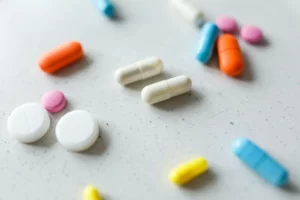Opioid Addiction
Rehab & Treatment
Begin your recovery journey today with Cornerstone Healing Center. Our opioid addiction rehab program provide the tools, support, and personalized care needed to help you overcome opioid dependency and build a healthier future.
Begin your insurance verification today

Our Opioid Addiction Rehab in Scottsdale and Phoenix, Arizona
At Cornerstone Healing Center, we understand the challenges of facing opioid addiction, and we’re here to help you every step of the way. Our opioid addiction treatment in Scottsdale and Phoenix, Arizona combines evidence-based therapies with genuine compassion to support your recovery journey.
With a team of dedicated addiction specialists—doctors, therapists, and counselors—we work with you to create a treatment plan tailored to your unique needs and goals. In our safe and welcoming environment, you’ll find the support, tools, and understanding needed to regain control and build a healthier, fulfilling life. Start your recovery with one of Arizona’s leading opioid addiction treatment programs today! Please keep in mind that placement depends on level of care, location, and your needs.
Understanding Opioid Addiction
What is Opioid Addiction
What Causes Opioid Addiction
The Symptoms of Opioid Addiction
Opioid addiction, known as Opioid Use Disorder (OUD), is a chronic condition where a person struggles with a powerful need to use opioids, even when it leads to negative effects on their health, relationships, and responsibilities. Opioids include illegal drugs like heroin, as well as prescription pain relievers like oxycodone, hydrocodone, and fentanyl.
Defined by the DSM-5, OUD includes using opioids in larger amounts than planned, finding it hard to cut down despite trying, and spending significant time focused on obtaining or using opioids. People with OUD often experience intense cravings, struggle to meet daily responsibilities, and continue using despite serious consequences. Over time, tolerance and withdrawal symptoms can also become part of the cycle, making it even harder to stop.
Opioid addiction often develops from a complex mix of genetic, environmental, and personal factors. For some, a genetic predisposition may increase their risk of addiction. Life circumstances—such as easy access to prescription pain medications, traumatic experiences, or family history of substance misuse—can also shape one’s vulnerability to opioids. Additionally, people facing untreated mental health challenges, like depression, anxiety, or PTSD, may turn to opioids to cope, unknowingly setting the stage for dependency.
The powerful effects of opioids, like intense euphoria and pain relief, act directly on the brain’s opioid receptors, reinforcing use and making opioid addiction a tough challenge to overcome. However, with the right treatment and support, breaking free from opioid addiction is not only possible but entirely achievable.
Opioid addiction can manifest through various signs and symptoms affecting physical, behavioral, cognitive, and psychosocial functioning. Recognizing the symptoms of opioid addiction can be crucial for early intervention and treatment. Common signs include:
- Taking larger amounts or using opioids longer than intended
- Persistent desire to reduce or control use but unsuccessful attempts to do so
- Spending significant time obtaining, using, or recovering from opioids
- Strong cravings for opioids
- Neglecting major responsibilities at work, school, or home
- Continued use despite experiencing physical or psychological harm
- Developing a tolerance, leading to a need for larger doses to achieve the same effect
- Experiencing withdrawal symptoms, such as nausea, sweating, anxiety, or muscle pain, when not using opioids
Our Opioid Drug Rehab Programs

Residential Programs
Our residential programs for opioid addiction provide immersive, round-the-clock support, integrating psychotherapy, medication, and holistic approaches. This structured environment helps clients address underlying issues and develop essential coping skills, creating a foundation for sustainable recovery and lasting freedom from opioid use disorder.

Outpatient Programs
Our outpatient programs for opioid treatment offer flexible therapy options designed to fit your life. Through a combination of psychotherapy, medication management, and supportive therapies, individuals can address opioid addiction while managing their daily responsibilities. This approach empowers clients to balance recovery with their everyday commitments.

Virtual IOP
For those who need flexibility, our virtual Intensive Outpatient Program (IOP) provides comprehensive opioid use treatment through an online platform. Clients receive individual therapy, group counseling, and a range of resources conveniently from home, making it easier to commit to recovery from any location.
Our Phoenix and Scottsdale, AZ Treatment Locations
Our Arizona treatment centers offer convenient access to Scottsdale and Phoenix addiction treatment centers. With multiple locations, you’ll receive personalized care, and be connected with a strong support system throughout your recovery journey. Walk-ins are welcome at our Phoenix location.
Benefits of
Opioid Drug Rehab for
Arizona Residents
Choosing to undergo opioid addiction treatment in Arizona provides a supportive and healing environment close to home, allowing residents to build a solid foundation for recovery. Our Arizona opioid rehab programs offer a personalized approach that combines evidence-based therapies, holistic care, and community support, helping clients address both physical dependence and underlying emotional challenges. With access to a dedicated team of specialists, Arizona residents can benefit from tailored care that fosters long-term sobriety and resilience in a familiar setting.
Integrative Recovery Approach
Our integrative recovery approach for opioid addiction is designed to support healing on every level: physical, mental, and emotional.
Dedication Clinical Team
Our dedicated clinical team offers specialized, evidence-based treatment for opioid addiction, combining expertise with empathy.
Comprehensive Care
Our opioid addiction treatment offers compassionate, ongoing support tailored to address the specific challenges of opioid dependency.
Broad Treatment Options
We provide truly personalized and holisitic care levels for a variety of substance use disorders allowing us to meet each client’s unique needs.
What to Expect
- An assessment of your individual needs and goals to create a personalized addiction rehabilitation plan.
- A treatment plan for mental health or co-occurring (or dual diagnosis) behavioral health conditions.
- Evidence-based therapies include cognitive behavioral therapy, dialectical behavior therapy, and trauma-informed care.
- Holistic approaches include yoga, meditation, art therapy, and music therapy
- Nutrition counseling and physical fitness activities for overall health and wellness.
- Family involvement in the recovery process through Common Ground or family sessions.
- Aftercare planning that includes relapse prevention strategies for long-term success in sobriety.
Client Family Testimonial
Meet Our Arizona Treatment Team
Meet our experienced masters-level treatment professionals passionately dedicated to providing compassionate, expert care in our state-of-the-art rehabilitation facilities and recovery centers in Scottsdale, AZ and Phoenix, AZ.
Clinical Director of Scottsdale Program
Eboni Fields, MS LPC
Eboni Fields, MS LPC, is a seasoned Clinical Director who brings over a decade of experience in behavioral health and substance abuse. She is a licensed professional counselor with a Masters in Mental Health Counseling from Grand Canyon University.
More About EboniClinical Director of Phoenix Program
Nate Bush, LCSW
Nate began his recovery journey in 2010 and earned a Master's in Social Work from ASU. He’s been in the Behavioral Health field since 2013. Specializing in CBT, DBT, and grief, Nate is now the Clinical Director of our Phoenix program, underlined by his passion for helping others who struggled with substance abuse issues as he did.
More About NateDoes opioid addiction treatment and rehab work?
Yes, opioid addiction treatment and rehab can be highly effective. At Cornerstone Healing Center, we use evidence-based therapies and compassionate support to help individuals overcome opioid addiction. Our tailored programs have helped many people regain control over their lives and achieve lasting recovery.
What are the signs of an opioid addiction?
Signs of opioid addiction include physical symptoms like increased tolerance, nausea, and slowed breathing, alongside behavioral changes like neglecting responsibilities and engaging in risky activities. Psychological signs can include intense cravings, mood swings, and impaired judgment. Recognizing these signs early is vital for seeking timely help.
What if my loved ones don’t want to go into rehab?
When a loved one resists rehab, support can start with honest, nonjudgmental conversations about their addiction’s impact. You might explore treatment options together, presenting possibilities without pressure. If you give our admissions line a call, we can provide you with a free, no-obligation, completely confidential consultation. We’d love to hear about your loved one and see what we can do to help.
Let's begin the journey together
Frequently Asked Questions
Knowledge base
Opioid Addiction
Get Started Now
Call and speak with one of our caring team members about help for you or a loved one.





